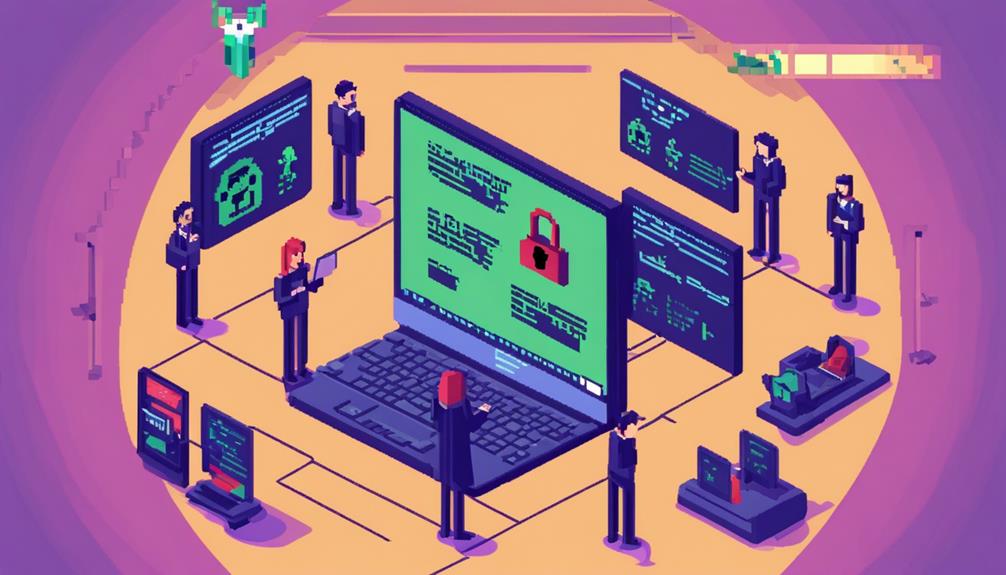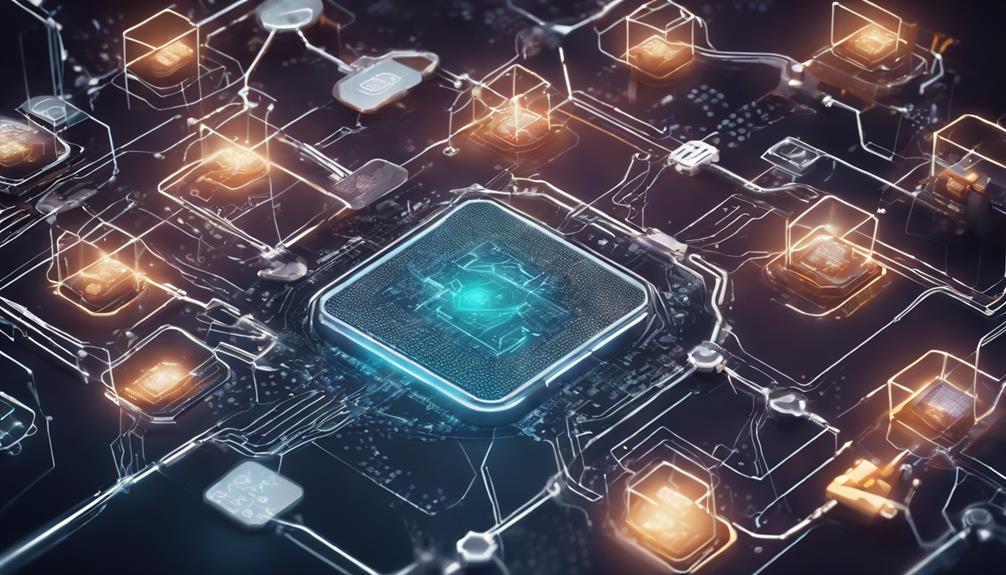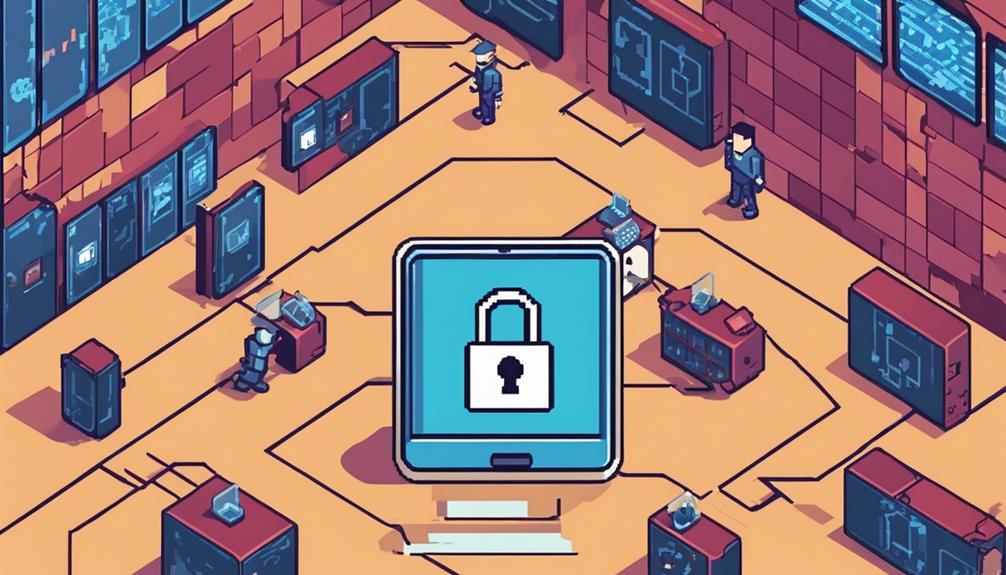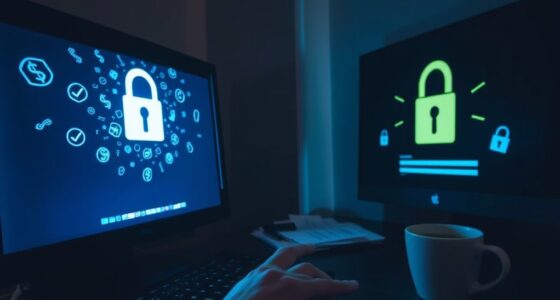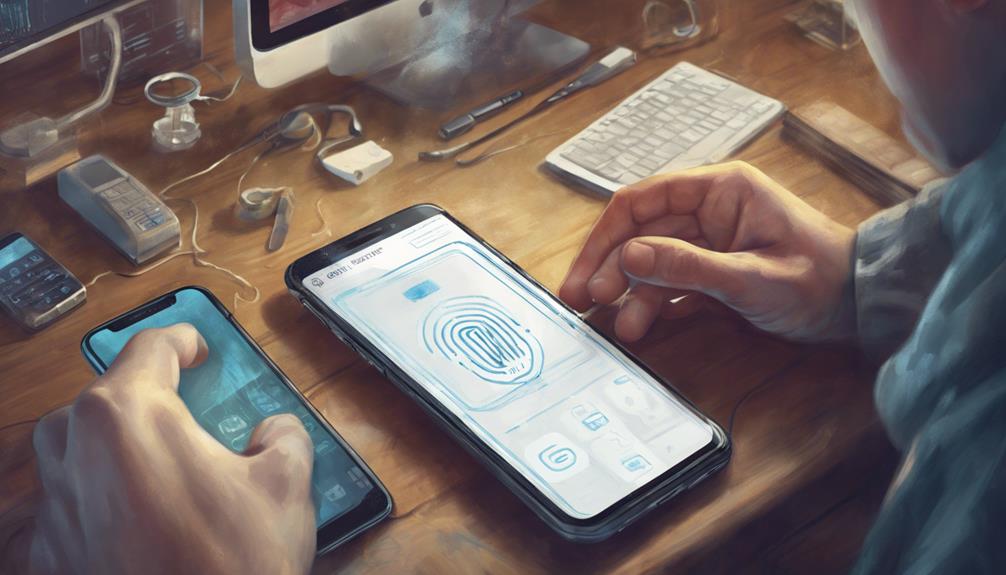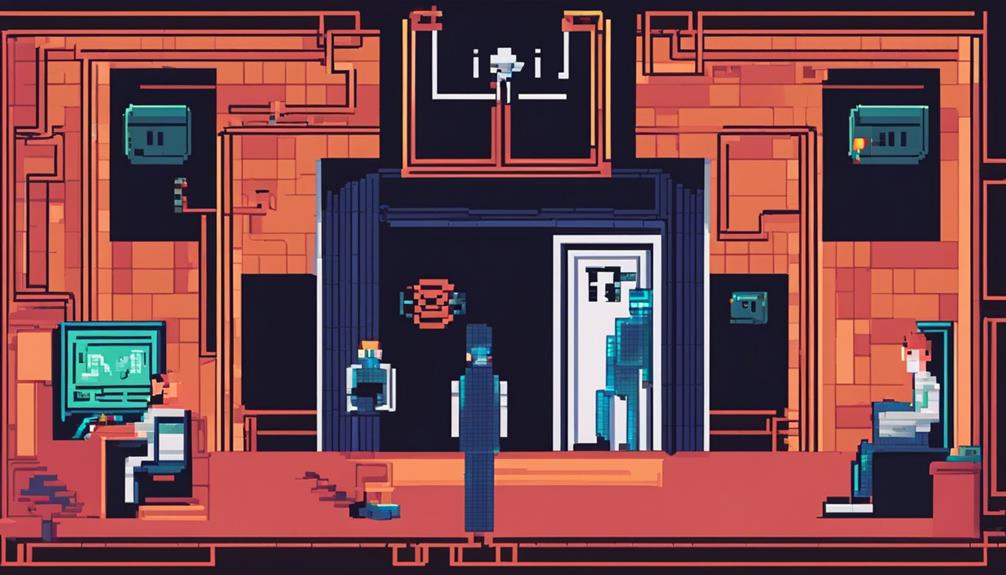Protect your computer by: creating strong passwords with a mix of characters, enabling 2FA, and updating software regularly. Use firewalls to block unauthorized access and encryption for data protection. Secure Wi-Fi with WPA3 encryption, strong passwords, and hidden SSID. Install quality antivirus software like Norton for malware defense. Avoid clicking on suspicious links and rely on cybersecurity tools like Guardio for extra protection. Additional expert tips and thorough guidance are available to enhance your computer's security.
Key Takeaways
- Use strong passwords and enable 2FA for added security.
- Update software regularly to patch vulnerabilities.
- Utilize firewalls and encryption to prevent unauthorized access.
- Secure Wi-Fi networks with WPA3 encryption and unique passwords.
- Install reputable antivirus software for malware protection.
Strong Passwords and 2FA
To enhance the security of your computer and online accounts, it is essential to implement strong passwords and enable two-factor authentication (2FA).
Strong passwords should include a mix of characters, numbers, and symbols to prevent hackers from easily guessing them. Additionally, enabling 2FA provides an extra layer of protection against unauthorized access by requiring a second verification step beyond just the password.
Avoid using easily guessable information like birthdays or common words in your passwords. Regularly updating and changing your passwords is vital to prevent hackers from gaining access to your accounts.
2FA greatly reduces the risk of unauthorized access, making it a powerful tool in enhancing security measures. By incorporating strong passwords and 2FA, you can effectively prevent hackers from infiltrating your accounts and make sure that your information remains secure.
Update Software Regularly

Consistently updating your software is essential for maintaining the security of your computer. By patching security vulnerabilities, you can reduce the risk of being targeted by hackers.
Make sure to enable automatic updates and monitor software versions to stay protected against cyber threats.
Patch Security Vulnerabilities
Updating software regularly is essential to patch security vulnerabilities and protect your computer from potential cyber threats. Hackers often exploit known security vulnerabilities in outdated software to launch cyberattacks and gain unauthorized access to systems.
To enhance your system security and safeguard against such threats, follow these key practices:
- Regularly Check for Software Updates: Stay vigilant for software updates as they frequently include important security patches to defend against cyber threats.
- Prioritize Security Patches: Make sure that you promptly install the latest security patches provided by software updates to strengthen your system's defenses.
- Mitigate Cyber Risks: By keeping your software up to date, you reduce the risk of falling victim to cyberattacks that target outdated vulnerabilities.
- Enhance System Security: Updating software is a proactive measure to enhance your system's security posture and protect against potential hacker exploits.
Enable Automatic Updates
Enabling automatic updates for your operating system and software is an important step in maintaining the security of your computer against potential cyber threats. Regular software updates help patch security vulnerabilities and protect your system from hacker exploits and cyber attacks.
Outdated software is a prime target for cybercriminals who exploit known weaknesses to breach your system. By enabling automatic updates, you guarantee seamless protection by keeping your software current and your system up to date.
Cybercriminals often prey on individuals with outdated software, making it essential to stay vigilant and proactive in updating your operating system and software. By staying current with software updates, you greatly reduce the risk of falling victim to hacking attempts and enhance your overall cybersecurity posture.
Monitor Software Versions
Maintaining a proactive approach to software security involves closely monitoring software versions to guarantee timely updates and safeguard against potential cyber threats.
Regularly updating software is essential, with 60% of data breaches attributed to unpatched vulnerabilities. Hackers often target outdated software, exploiting 86% of vulnerabilities within a day of disclosure.
Software updates frequently contain security patches that fix known vulnerabilities, protecting systems from cyber threats. Setting up automatic updates is a practical way to make sure software remains current and shielded from potential security risks.
- Monitor software versions diligently to stay ahead of cyber threats.
- Update software promptly to address security vulnerabilities.
- Install security patches to protect against potential risks.
- Avoid unauthorized access by ensuring regular software updating practices.
Use Firewalls and Encryption
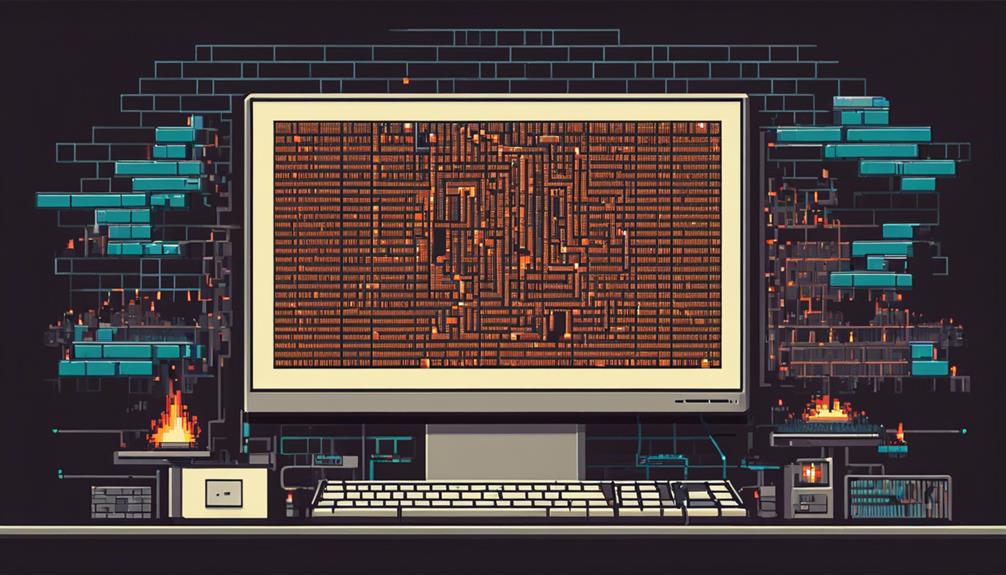
Firewalls serve as a protective barrier against hackers, preventing unauthorized access to your computer.
Encryption plays an essential role in securing your data by converting it into a code that only authorized individuals can understand.
Utilizing built-in firewalls and implementing strong encryption protocols are key steps in fortifying your computer against cyber threats and ensuring the safety of your information.
Firewall Protection Basics
Utilizing firewalls and encryption is essential for safeguarding your computer system against potential hacker threats.
When it comes to firewall protection basics, here are key points to keep in mind:
- Enable your computer's built-in firewall or invest in a hardware firewall to enhance protection.
- Firewalls play an important role in detecting intrusion attempts and blocking unauthorized access to your system.
- Encryption adds another layer of security by encoding your data, making it inaccessible to unauthorized parties.
- For larger organizations handling sensitive information, utilizing business networking firewalls is highly recommended.
Additionally, turning on encryption for your Wi-Fi network can provide an extra shield against hackers trying to infiltrate your system.
Importance of Encryption
How critical is encryption in ensuring the security of your data and protecting it from unauthorized access? Encryption plays a crucial role in safeguarding your information from cyber threats. By converting your data into a code that only authorized users can decipher, encryption prevents hackers from infiltrating and accessing your sensitive information. Firewalls act as a protective barrier for your computer, monitoring and controlling network traffic to prevent unauthorized access. When used in conjunction with encryption, firewalls enhance online security and protect your data from potential breaches.
| Encryption | Importance |
|---|---|
| Secure your data | Prevent unauthorized access |
| Protect sensitive information | Enhance online security |
| Thwart cyber threats | Safeguard against data breaches |
Implementing encryption on Wi-Fi networks adds an extra layer of security, making it harder for hackers to intercept your data. To secure your computer effectively, it is essential to utilize encryption and firewalls to fortify your defenses against online threats.
Secure Wi-Fi Network

To bolster the security of your computer system and ensure the protection of your data and privacy, it is vital to fortify your Wi-Fi network with robust encryption measures and best practices.
When securing your Wi-Fi network, consider the following key steps:
- Implement WPA3 encryption to safeguard your network against unauthorized access.
- Utilize a strong password unique to your network to enhance its security.
- Disable guest network access to minimize potential vulnerabilities.
- Hide your SSID to reduce visibility to unauthorized users.
Additionally, regularly monitoring incoming and outgoing network traffic is essential in detecting any suspicious activity promptly.
By taking these precautions, you can create a more secure network environment, decreasing the risk of unauthorized access and potential data breaches.
Quality Antivirus Software
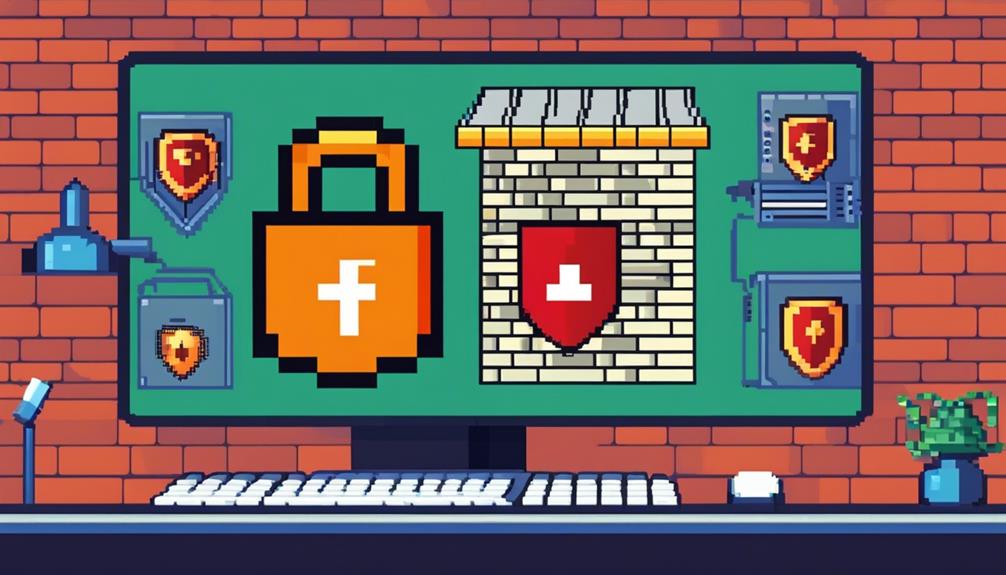
Securing your computer system not only involves fortifying your Wi-Fi network but also entails installing reputable antivirus software like Norton, McAfee, or Bitdefender to protect your system from malware and cyber threats.
Antivirus software plays an important role in safeguarding your computer by scanning and detecting malicious files, viruses, and spyware, keeping your system secure. It is essential to update your antivirus software regularly to make sure it can effectively identify and prevent the latest cyber threats.
The real-time protection feature offered by antivirus software actively monitors your computer for any suspicious activity or malware, providing an additional layer of security. Additionally, a firewall, a critical component of antivirus software, helps block unauthorized access to your system, further enhancing your overall cybersecurity.
Avoid Clicking Suspicious Links

One common practice to enhance cybersecurity is refraining from clicking on links in emails or messages that appear suspicious. Hackers often use phishing emails with these suspicious links to trick users into revealing personal information or installing malware. Clicking on such links can lead to malware infections, data breaches, or identity theft.
To avoid falling victim to these cyber threats, follow these key tips:
- Always verify the sender's identity before clicking on any links.
- Double-check the URL to make sure it matches the expected website.
- Utilize email filters to help identify and block potentially harmful links.
- Enhance your security measures by using reliable security software to detect and prevent malicious links.
Educating yourself and your team about the dangers of clicking on suspicious links is essential in preventing cyber attacks. By staying vigilant and implementing these practices, you can reduce the risk of falling into the traps set by cybercriminals.
Guardio Cybersecurity Protection
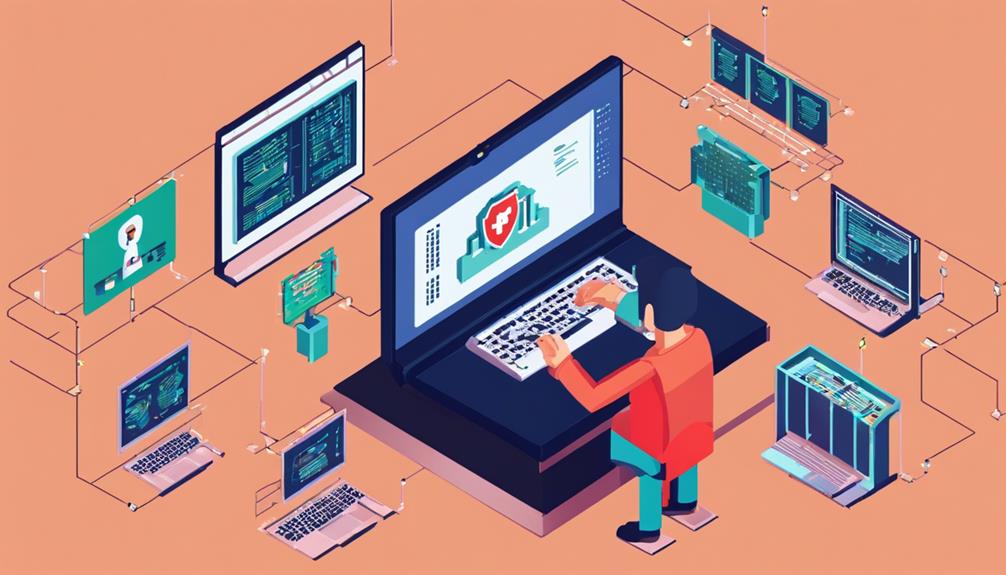
Guardio Cybersecurity Protection offers thorough solutions to safeguard individuals and families from cyber threats, providing detailed identity theft protection and defense against various online risks. By utilizing Guardio, users can protect their computers from hackers and prevent financial losses by securing personal data.
Guardio's cybersecurity features include anti-malware software and real-time threat detection, ensuring a proactive defense against malicious attacks. Additionally, Guardio helps users secure their online accounts and defend against phishing attacks, which are common tactics used by cybercriminals to steal sensitive information.
With Guardio's extensive protection measures in place, individuals and families can browse the internet with peace of mind, knowing that their identities and personal data are safeguarded from potential threats. Stay ahead of cyber risks and keep your digital presence secure with Guardio Cybersecurity Protection.
Frequently Asked Questions
What Protects Your Computer From Hackers?
Various cybersecurity measures safeguard computers from hackers, such as firewalls blocking unauthorized access, antivirus software detecting and removing malware, strong password security preventing unauthorized entry, regular software updates patching vulnerabilities, and network security using encryption and secure connections.
What Is the Most Common Way a Hacker Gets Access to Your Computer?
The most common way a hacker gains access to your computer is through phishing emails, tricking users into divulging sensitive information. According to recent studies, 91% of successful cyberattacks start with a phishing email, highlighting the importance of awareness and vigilance.
What Are 3 Ways You Can Ensure Your Safety if You Get Hacked?
If you get hacked, guarantee safety by disconnecting from the internet, changing all passwords, and reporting suspicious activities to financial institutions. Additionally, scan for malware and viruses, and consider employing cybersecurity services to prevent future attacks.
What Gives Hackers Open Access to Your Computer?
Hackers gain open access to your computer through weak passwords, outdated software, clicking on malicious links, unsecured Wi-Fi networks, and lack of firewall protection. These vulnerabilities create opportunities for hackers to infiltrate and compromise your system.
Conclusion
To sum up, safeguarding your computer against hackers is vital in today's digital age. By following expert tips such as creating strong passwords, enabling 2FA, updating software regularly, using firewalls and encryption, securing your Wi-Fi network, installing quality antivirus software, and avoiding suspicious links, you can greatly reduce the risk of cyber threats.
Remember, prevention is key in keeping your personal information and data secure. As the saying goes, 'An ounce of prevention is worth a pound of cure.' Stay vigilant and protect your digital assets.
